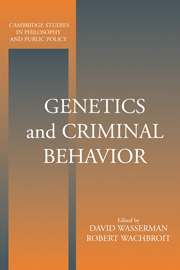Book contents
- Frontmatter
- Contents
- List of Contributors
- Acknowledgments
- 1 Introduction: Methods, Meanings, and Morals
- PART I
- 2 Understanding the Genetics-of-Violence Controversy
- 3 Separating Nature and Nurture
- 4 Genetic Explanations of Behavior: Of Worms, Flies, and Men
- 5 On the Explanatory Limits of Behavioral Genetics
- 6 Degeneracy, Criminal Behavior, and Looping
- 7 Genetic Plans, Genetic Differences, and Violence: Some Chief Possibilities
- PART II
- Index
3 - Separating Nature and Nurture
Published online by Cambridge University Press: 05 June 2012
- Frontmatter
- Contents
- List of Contributors
- Acknowledgments
- 1 Introduction: Methods, Meanings, and Morals
- PART I
- 2 Understanding the Genetics-of-Violence Controversy
- 3 Separating Nature and Nurture
- 4 Genetic Explanations of Behavior: Of Worms, Flies, and Men
- 5 On the Explanatory Limits of Behavioral Genetics
- 6 Degeneracy, Criminal Behavior, and Looping
- 7 Genetic Plans, Genetic Differences, and Violence: Some Chief Possibilities
- PART II
- Index
Summary
Plant and animal breeders routinely attempt to disentangle the contributions of nature and nurture when they think about what makes corn grow tall or cows produce more milk. To apply the same concepts to human characteristics such as intelligence and violence, however, is politically explosive.
The discipline of quantitative genetics separates the relative contributions of genes and environment by deploying a set of technical concepts. The main one is called “variance,” which measures how much a trait varies in a population. Nature and nurture are analyzed by discussing variance in its different forms; there is phenotypic variance, genetic variance, environmental variance, and variance due to gene-environment interaction. Is it solely political considerations that make some people resist applying these humdrum scientific concepts to human beings? Or are there purely scientific considerations that block the easy transfer of these concepts from one domain to the other? I do not pose this question to disparage the significance of political questions; science is a human activity, and whether a scientific question should be pursued depends on what the consequences for human welfare would be of pursuing it. However, my goal in this chapter is to explain why the issue is not purely political. I am not going to argue that human beings and their traits are somehow outside the scope of biology, whatever that might mean. A human being develops a level of intelligence and attitudes toward violence because of the genes he or she possesses and the environments he or she inhabits.
- Type
- Chapter
- Information
- Genetics and Criminal Behavior , pp. 47 - 78Publisher: Cambridge University PressPrint publication year: 2001
- 15
- Cited by



